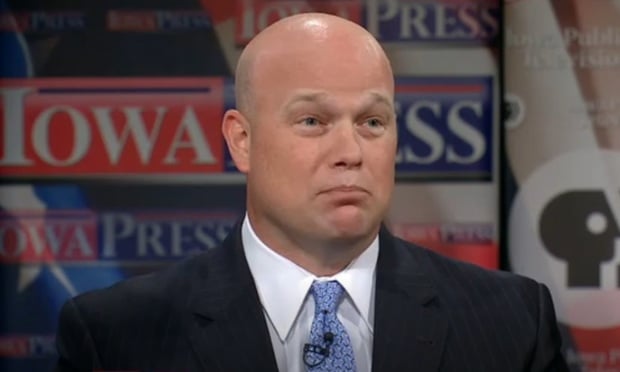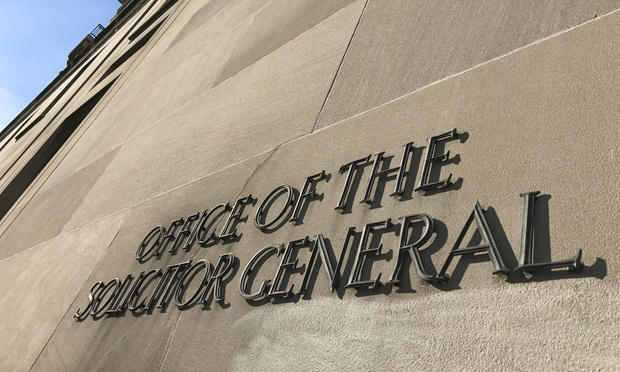Challengers to Matt Whitaker's Appointment Ask Justices for Rare Argument
The Supreme Court's rules don't forbid argument on motions, but do say they "will not be permitted unless the court so directs."
November 30, 2018 at 10:02 AM
6 minute read
 Then-candidate Matt Whitaker appearing on Iowa public television in 2014. (Photo: PBS screen grab)
Then-candidate Matt Whitaker appearing on Iowa public television in 2014. (Photo: PBS screen grab)
Challengers to the Trump administration's appointment of Matthew Whitaker as the acting U.S. attorney general are asking the U.S. Supreme Court justices to do something they almost never do: hear oral argument on a court motion.
The Supreme Court is routinely asked to resolve various types of motions during any given term—lawyers ask for more time to file papers, or perhaps they want to file a brief under seal or out of time. Most of these requests are disposed of through a simple order—without oral argument.
In the case Michaels v. Whitaker, Thomas Goldstein of Washington's Goldstein & Russell and Michael Zapin of Boca Raton, Florida, filed a motion to substitute Deputy Attorney General Rod Rosenstein for Whitaker in a gun-related case. The two lawyers have asked the justices to hold arguments on their motion, which contends Whitaker's appointment violates the Constitution's appointments clause.
Whitaker's appointment, replacing Jeff Sessions after his ouster, has stirred controversy and kicked up myriad court challenges across the country. Critics fear Whitaker, who had assailed the special counsel's Russia investigation while a lawyer in private practice, could take steps to impede the ongoing probe. President Trump has not announced a permanent successor to Sessions, and no timeline has been provided by the White House.
“The president has gone well past disheartening tweets. This is a power grab. It is a power grab designed to protect the president personally by evading the authority and responsibility of the Senate and this court under the Constitution,” Goldstein wrote in a court filing Wednesday. “Yes, the court can blink at that reality, decline to act, and move on. But history will regret that it did.”
The Justice Department, in the Supreme Court and elsewhere, has defended the appointment of Whitaker, a former U.S. attorney in Iowa, as lawful.
Motions to substitute one defendant or party for another are routine. Argument on them is far from it. Indeed, the justices don't appear ever to have held oral arguments on a motion to substitute. Goldstein, in an interview with The National Law Journal, said there are good reasons the justices should hear him out in open court.
“It makes sense the court would want to have argument,” Goldstein said. “It's just so serious. This is in the form of a motion to substitute because it is the only form available, but the legal question is a big deal. It's the substance, not the package.”
There is some precedent—at least for the substance, if not the package—of the Whitaker challenge. Goldstein and Zapin noted in their papers Wednesday that the justices have held that they will decide an appointments clause challenge in the first instance—without a ruling by a lower court. The attorneys pointed to the 1991 case Freytag v. Commissioner.
The Freytag citation was a clever reference. In that case, the Supreme Court said it would review the appointments clause challenge to the assignment of special trial judges by the Tax Court even though the challengers had waived the claim in the lower courts. The court found no constitutional violation. The then-principal deputy solicitor general, John Roberts Jr., argued for the government.
 U.S. solicitor general's office at Main Justice. (Photo: Mike Scarcella/ ALM)
U.S. solicitor general's office at Main Justice. (Photo: Mike Scarcella/ ALM)U.S. Solicitor General Noel Francisco, responding to the motion to substitute, called it a “procedural gambit that should be rejected.” He argued the real party in interest is the U.S. Justice Department or the United States and not the individual performing the duties of the attorney general at a particular time.
The Supreme Court's rules don't forbid argument on motions, but do say they “will not be permitted unless the court so directs.”
Edward Hartnett of Seton Hall University School of Law and co-author of Supreme Court Practice could not recall any oral arguments on a motion to substitute. He said there have been arguments on other kinds of motions.
A motion for leave to file a bill of complaint in an original jurisdiction case was heard in 1971 in the case Ohio v. Wyandotte Chemicals. And there was oral argument on cross-motions for summary judgment in the 1992 original jurisdiction case United States v. Alaska.
Before 1980, a party petitioning for an extraordinary writ would file a motion for leave to file the petition, as required for original actions. “Just as oral argument might be heard on the motion for leave to file in original actions, so too it might be heard on motions for leave to file a petition for an extraordinary writ,” Hartnett said.
That's what happened in Hirota v. MacArthur, a post-World War II military tribunal case in which Japanese residents and citizens, two of whom had been sentenced to death, filed motions for leave to file petitions for habeas corpus, said Stephen Vladeck of the University of Texas School of Law. The justices held oral arguments on the motions and then, in an unsigned opinion, ruled that it lacked jurisdiction over the petitions.
The requirement of a motion for leave to file was abolished with the court's 1980 rules, according to Hartnett. “Now, one simply files the petition for the extraordinary writ,” he said.
There also have been several oral arguments on applications to individual justices for stays or bail. The last one was before Justice Thurgood Marshall in 1980, according to Cynthia Rapp, the Supreme Court's former deputy clerk for case management who prepared the In Chambers collection of applications to individual justices.
Several court scholars said they did not anticipate the Supreme Court would hear the motion to substitute Rosenstein for Whitaker. There is no indication when the justices will rule.
Read more:
Quotable Matt Whitaker: Nothing Sticks to Trump, 'Even Being a Misogynist'
Matthew Whitaker's Financial Disclosures Show CNN, Consulting Income
Justices Urged to Review Whitaker's Appointment as Acting Attorney General
FTC Is Pressed Over Matt Whitaker's Role Advising Company Accused of Fraud
This content has been archived. It is available through our partners, LexisNexis® and Bloomberg Law.
To view this content, please continue to their sites.
Not a Lexis Subscriber?
Subscribe Now
Not a Bloomberg Law Subscriber?
Subscribe Now
NOT FOR REPRINT
© 2025 ALM Global, LLC, All Rights Reserved. Request academic re-use from www.copyright.com. All other uses, submit a request to [email protected]. For more information visit Asset & Logo Licensing.
You Might Like
View All
'Something Else Is Coming': DOGE Established, but With Limited Scope

Supreme Court Considers Reviving Lawsuit Over Fatal Traffic Stop Shooting

US DOJ Threatens to Prosecute Local Officials Who Don't Aid Immigration Enforcement
3 minute read
US Judge Cannon Blocks DOJ From Releasing Final Report in Trump Documents Probe
3 minute readTrending Stories
Who Got The Work
J. Brugh Lower of Gibbons has entered an appearance for industrial equipment supplier Devco Corporation in a pending trademark infringement lawsuit. The suit, accusing the defendant of selling knock-off Graco products, was filed Dec. 18 in New Jersey District Court by Rivkin Radler on behalf of Graco Inc. and Graco Minnesota. The case, assigned to U.S. District Judge Zahid N. Quraishi, is 3:24-cv-11294, Graco Inc. et al v. Devco Corporation.
Who Got The Work
Rebecca Maller-Stein and Kent A. Yalowitz of Arnold & Porter Kaye Scholer have entered their appearances for Hanaco Venture Capital and its executives, Lior Prosor and David Frankel, in a pending securities lawsuit. The action, filed on Dec. 24 in New York Southern District Court by Zell, Aron & Co. on behalf of Goldeneye Advisors, accuses the defendants of negligently and fraudulently managing the plaintiff's $1 million investment. The case, assigned to U.S. District Judge Vernon S. Broderick, is 1:24-cv-09918, Goldeneye Advisors, LLC v. Hanaco Venture Capital, Ltd. et al.
Who Got The Work
Attorneys from A&O Shearman has stepped in as defense counsel for Toronto-Dominion Bank and other defendants in a pending securities class action. The suit, filed Dec. 11 in New York Southern District Court by Bleichmar Fonti & Auld, accuses the defendants of concealing the bank's 'pervasive' deficiencies in regards to its compliance with the Bank Secrecy Act and the quality of its anti-money laundering controls. The case, assigned to U.S. District Judge Arun Subramanian, is 1:24-cv-09445, Gonzalez v. The Toronto-Dominion Bank et al.
Who Got The Work
Crown Castle International, a Pennsylvania company providing shared communications infrastructure, has turned to Luke D. Wolf of Gordon Rees Scully Mansukhani to fend off a pending breach-of-contract lawsuit. The court action, filed Nov. 25 in Michigan Eastern District Court by Hooper Hathaway PC on behalf of The Town Residences LLC, accuses Crown Castle of failing to transfer approximately $30,000 in utility payments from T-Mobile in breach of a roof-top lease and assignment agreement. The case, assigned to U.S. District Judge Susan K. Declercq, is 2:24-cv-13131, The Town Residences LLC v. T-Mobile US, Inc. et al.
Who Got The Work
Wilfred P. Coronato and Daniel M. Schwartz of McCarter & English have stepped in as defense counsel to Electrolux Home Products Inc. in a pending product liability lawsuit. The court action, filed Nov. 26 in New York Eastern District Court by Poulos Lopiccolo PC and Nagel Rice LLP on behalf of David Stern, alleges that the defendant's refrigerators’ drawers and shelving repeatedly break and fall apart within months after purchase. The case, assigned to U.S. District Judge Joan M. Azrack, is 2:24-cv-08204, Stern v. Electrolux Home Products, Inc.
Featured Firms
Law Offices of Gary Martin Hays & Associates, P.C.
(470) 294-1674
Law Offices of Mark E. Salomone
(857) 444-6468
Smith & Hassler
(713) 739-1250










